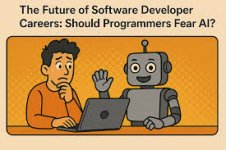Introduction: Code or Be Coded?
In the last few decades, coding has evolved from a niche hobby to one of the most in-demand and high-paying skills globally. But in a shocking twist, the very machines developers help build may be coming for their jobs.
With tools like GitHub Copilot, OpenAI's Codex, and even ChatGPT writing production-level code, the question is no longer if AI can code—it’s when human coders will become obsolete.
Or will they?
AI: The New Developer on the Block
Let’s face it—AI is getting scarily good at programming.
AI can now:
Auto-complete entire functions from a single comment
Detect and fix bugs faster than junior developers
Translate code across languages
Build MVPs of apps without any human input
This isn't the future. This is now.
Companies are already saving time and money by offloading routine coding tasks to AI systems. And with every iteration, these systems are learning. Fast.
So what’s stopping AI from taking over?
Not much—except, maybe, creativity and context.
What Programmers Still Do Better (For Now)
Sure, AI can generate code, but can it:
Understand vague client requirements?
Make architectural decisions based on long-term scalability?
Navigate legacy spaghetti code written by 10 different devs over 6 years?
Decide why something should be built, not just how?
AI lacks intuition, domain expertise, and the human touch needed to collaborate, innovate, and adapt on the fly. But for how long?
The Rise of Prompt Engineering: A New Coding Paradigm?
Here’s a controversial take: coding might die—but programmers won’t.
We’re already seeing a shift from typing out syntax to prompting AI tools to generate functionality. Enter: prompt engineers—people who don’t code traditionally but can command powerful results from AI models by using natural language.
Is the future of programming less “brackets and semicolons” and more “describe what you want and let the AI build it”?
That’s not coding. That’s commanding.
Let’s Be Honest—Do We Even Like Writing Code?
Here’s where it gets juicy: Most devs don’t actually like writing code. They like solving problems. They like building stuff. If AI helps them get there faster, is that really a threat—or a superpower?
But for the gatekeepers of the old way, this is a terrifying thought. And for junior devs trying to break in? It's even scarier.
AI may not take your job—but someone using AI will.
Conclusion: Adapt or Be Automated
The future of computers is not silicon. It’s synergy. Humans and AI working together—or, for some, competing. The age of the rockstar solo coder is ending. The age of the AI-powered problem solver is beginning.
So ask yourself: Are you learning to code, or are you learning to think?
Because in 10 years, the latter might be all that matters.
What Do YOU Think?
Will AI truly replace human programmers?
Is prompt engineering a skill worth mastering?
Should we be worried—or excited?
Drop your thoughts in the comments—especially if you disagree. Let’s start a real conversation.
By Shashwat
In the last few decades, coding has evolved from a niche hobby to one of the most in-demand and high-paying skills globally. But in a shocking twist, the very machines developers help build may be coming for their jobs.
With tools like GitHub Copilot, OpenAI's Codex, and even ChatGPT writing production-level code, the question is no longer if AI can code—it’s when human coders will become obsolete.
Or will they?
AI: The New Developer on the Block
Let’s face it—AI is getting scarily good at programming.
AI can now:
Auto-complete entire functions from a single comment
Detect and fix bugs faster than junior developers
Translate code across languages
Build MVPs of apps without any human input
This isn't the future. This is now.
Companies are already saving time and money by offloading routine coding tasks to AI systems. And with every iteration, these systems are learning. Fast.
So what’s stopping AI from taking over?
Not much—except, maybe, creativity and context.
What Programmers Still Do Better (For Now)
Sure, AI can generate code, but can it:
Understand vague client requirements?
Make architectural decisions based on long-term scalability?
Navigate legacy spaghetti code written by 10 different devs over 6 years?
Decide why something should be built, not just how?
AI lacks intuition, domain expertise, and the human touch needed to collaborate, innovate, and adapt on the fly. But for how long?
The Rise of Prompt Engineering: A New Coding Paradigm?
Here’s a controversial take: coding might die—but programmers won’t.
We’re already seeing a shift from typing out syntax to prompting AI tools to generate functionality. Enter: prompt engineers—people who don’t code traditionally but can command powerful results from AI models by using natural language.
Is the future of programming less “brackets and semicolons” and more “describe what you want and let the AI build it”?
That’s not coding. That’s commanding.
Let’s Be Honest—Do We Even Like Writing Code?
Here’s where it gets juicy: Most devs don’t actually like writing code. They like solving problems. They like building stuff. If AI helps them get there faster, is that really a threat—or a superpower?
But for the gatekeepers of the old way, this is a terrifying thought. And for junior devs trying to break in? It's even scarier.
AI may not take your job—but someone using AI will.
Conclusion: Adapt or Be Automated
The future of computers is not silicon. It’s synergy. Humans and AI working together—or, for some, competing. The age of the rockstar solo coder is ending. The age of the AI-powered problem solver is beginning.
So ask yourself: Are you learning to code, or are you learning to think?
Because in 10 years, the latter might be all that matters.
What Do YOU Think?
Will AI truly replace human programmers?
Is prompt engineering a skill worth mastering?
Should we be worried—or excited?
Drop your thoughts in the comments—especially if you disagree. Let’s start a real conversation.
By Shashwat


